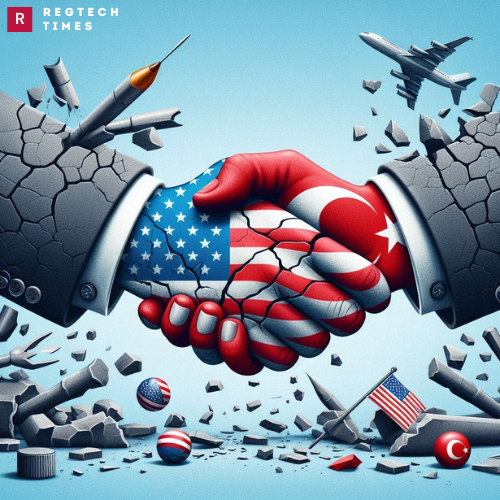Turkey’s military-linked exports are now a focal point of concern for the United States, which has issued a stern warning about potential “consequences” if Ankara fails to curb its trade of US military-linked hardware to Russia. This development is a significant escalation amid the ongoing tensions surrounding Russia’s military actions in Ukraine.
The US, along with its allies, has imposed extensive sanctions on Moscow, but Turkey has continued to strengthen its trade ties with Russia, creating friction with Western partners who seek to isolate and pressure Russia economically.
US Concerns Over Turkey’s Military-Linked Exports
Matthew Axelrod, the Assistant Commerce Secretary leading US efforts to prevent sensitive technology from reaching adversaries, recently visited Turkish officials and business leaders in Ankara and Istanbul. His mission was clear: Turkey must intensify its efforts to halt the flow of American-origin technology, which is pivotal for Moscow’s war machine. In a statement, it was emphasized by Axelrod that urgency was paramount, stating, “The illicit flow of US technology to Russia needs to be stopped with Turkey’s assistance. Progress needs to be seen, and quickly, by Turkish authorities and industry, or consequences will have to be imposed on those who evade our export controls.”
Eroding NATO Relations
This warning from Washington highlights the growing strain on US-Turkey relations. Despite being NATO allies, Turkey’s decision to bolster trade with Russia since the latter’s full-scale invasion of Ukraine in 2022 has been a point of contention. The US, along with the EU and other Western partners, has enforced stringent sanctions on Russia. However, Turkey has chosen a different path, augmenting its trade with Moscow, much to the frustration of its NATO counterparts.
Critical Hub for Military-Linked Goods
The US is especially concerned about Turkey’s role as a key channel through which Western-made electronics and machine tools are delivered to Russia. These components, including processors, memory cards, and amplifiers, are essential for Russian missiles and drones, contravening established export controls. Brian Nelson, the US Treasury Under-Secretary for Terrorism and Financial Intelligence, expressed his frustration over Turkey’s trade in military-linked goods during his visit to the country late last year.
The Grim Reality of Sudan War: Unchecked Arms Flow from Turkey and UAE Amidst Embargo
The US, EU, UK, and Japan have collaboratively targeted approximately 50 categories of civilian products with military applications, viewing them as high priorities for Russia’s war efforts. According to the US Commerce Department, Turkey ranks as the second-largest source of high-priority US-origin goods sent to Russia, trailing only behind China.
Pressure and Sanctions on Turkey’s Companies
Axelrod’s message to the Turkish government was unambiguous: this trade is an “urgent problem.” He urged Ankara to adopt and enforce a ban on the transshipment of US-controlled items to Russia, highlighting that Moscow is “trying to exploit Turkey’s trade policy” to acquire US parts.
US Sanctions Intensify Russian Payment Issues with Its Allies China, Turkey and India
The Commerce Department has already added 18 Turkish companies to its “entities list,” necessitating rare licenses for American companies to sell sensitive parts to these groups. Axelrod warned that more companies could be added to this list if significant progress is not made.
The US Treasury has also sanctioned several Turkish companies for allegedly supplying Russia’s military-industrial complex. Despite these measures, Turkey’s exports of high-priority military-linked goods to Russia, or to intermediaries like Azerbaijan and Kazakhstan, have surged since the war began. Turkish customs data revealed that exports registered $85 million in the first six months of this year, a marked increase from $27 million in the same period in 2022.
Yuksel Senbol Unveils the Sinister Side of US Defense Contracts, Turkey Nexus Exposed
Challenges and Progress
A significant portion of these exports is involved in what is known as a “ghost trade,” where goods disappear and never actually reach the markets they were intended for. This large rise in Turkey’s exports has not corresponded with a similar rise in imports reported by Azerbaijan, Kazakhstan, and Kyrgyzstan, indicating a possible diversion to Russia.
Combating AML in Turkey: Expanding Role of Digital Currencies
However, there has been a slight easing of Turkey’s exports of military-linked goods from the highs set in 2023. The executive order issued by the Biden administration permits the US to regard any foreign financial company engaging with a sanctioned Russian entity as if it were directly supporting Russia’s military-industrial base. This measure has significantly increased the costs Russia must pay to import US-origin goods from Turkey.
Despite these efforts, Axelrod emphasized that the current level of illicit trade remains too high. The US remains vigilant and prepared to impose further consequences if Turkey does not make substantial strides in curbing the flow of military-linked goods to Russia. The ongoing situation highlights the complex dynamics and challenges of aligning international trade practices with geopolitical strategies amidst the Ukraine conflict.


